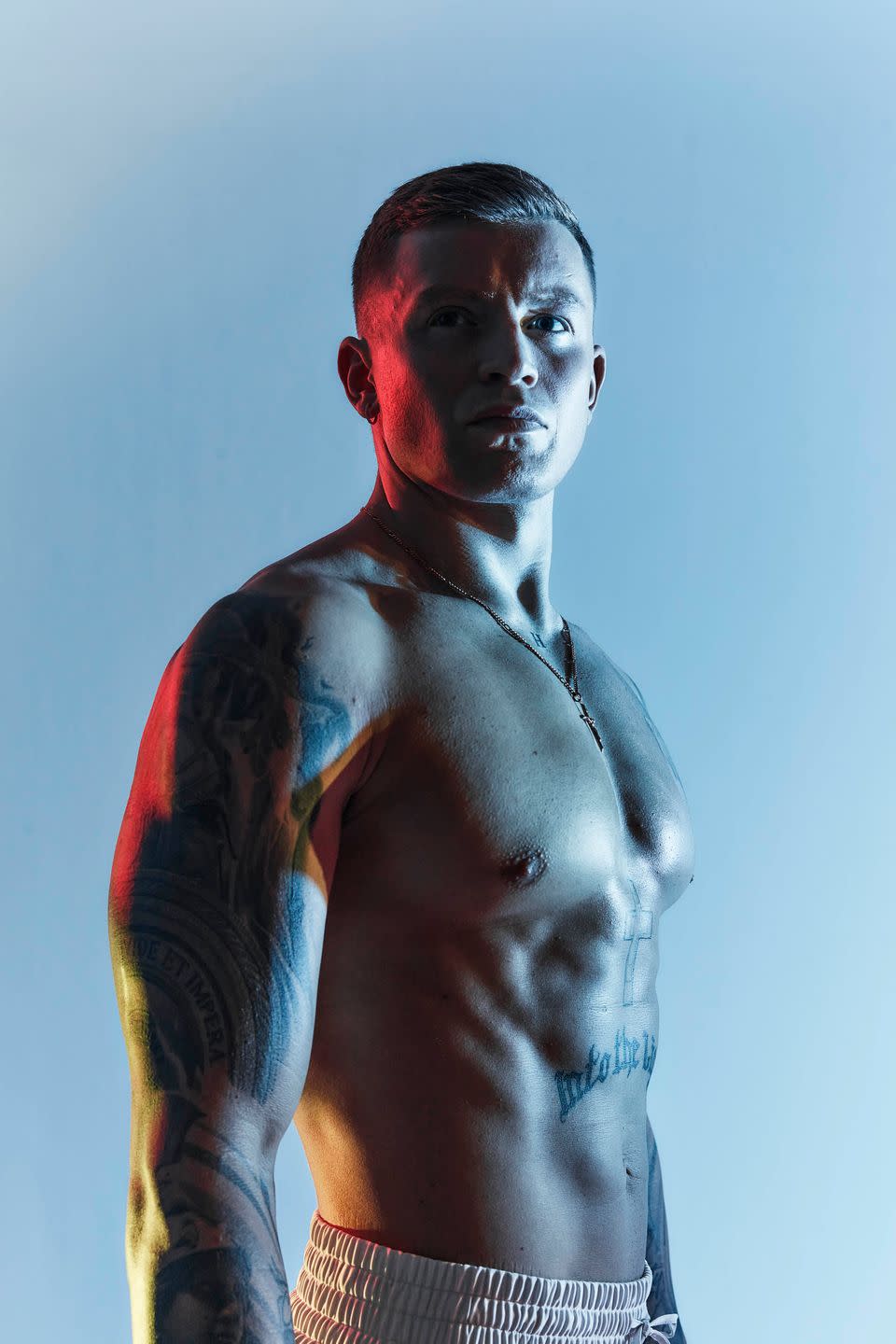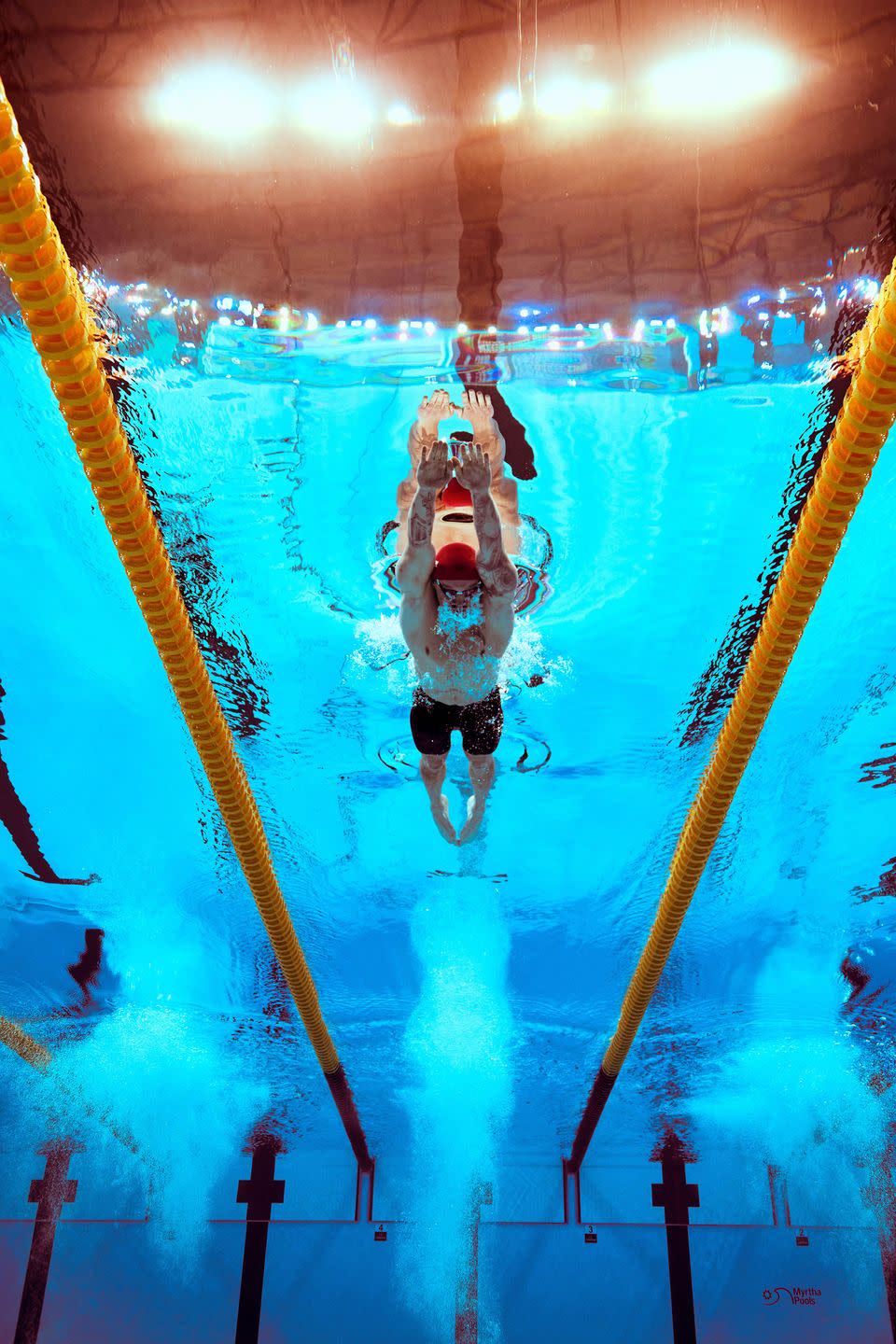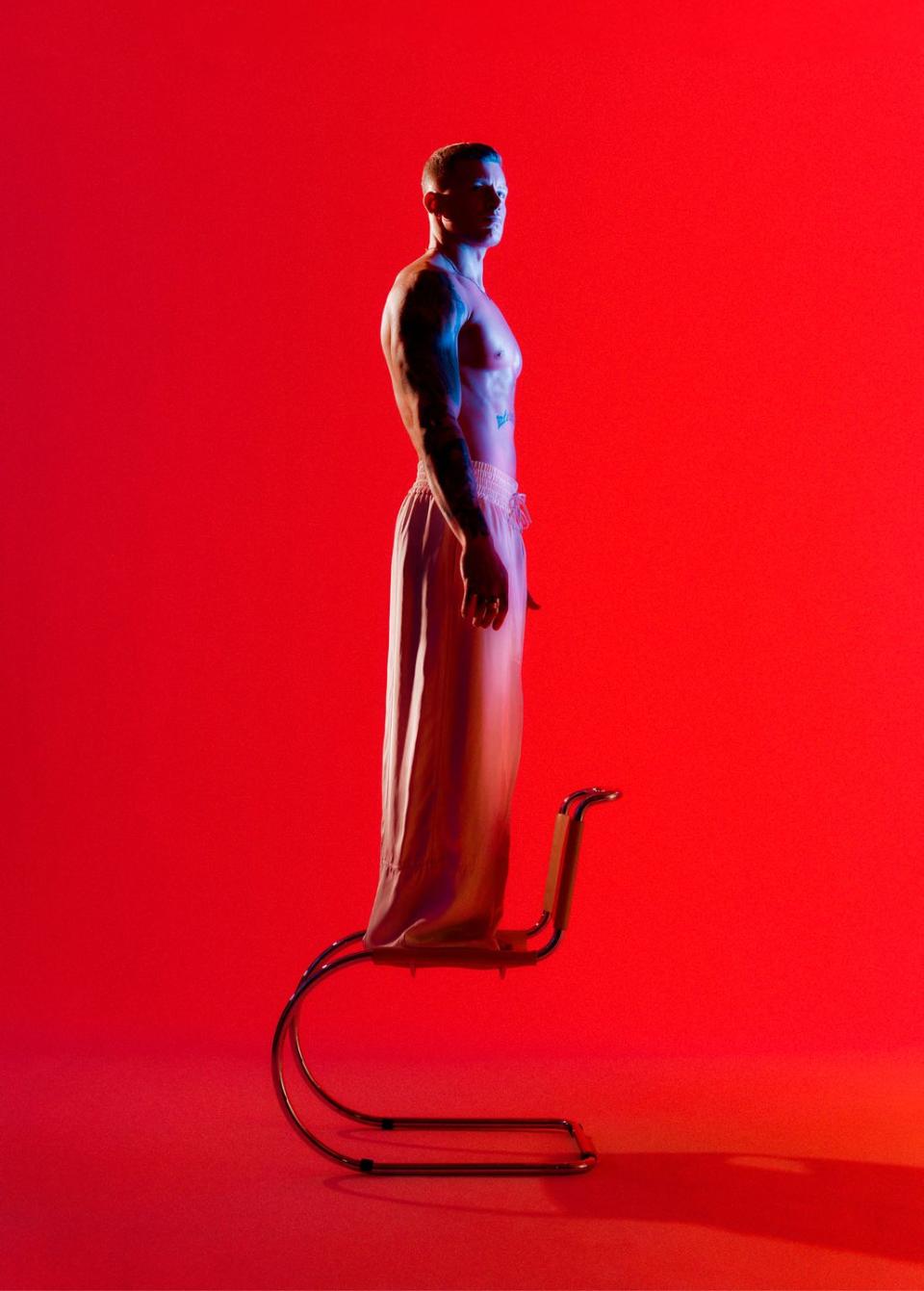Adam Peaty: ‘My Mentality Got Me Medals, but It Has Cost Me’

‘Vincit qui se vincit.’ He conquers who conquers himself.
Spend an afternoon with Adam Peaty and you’ll learn that he’s a man who lives by such quotations. And they seem to work: not only is he one of the most decorated swimmers of all time, but also one of the greatest athletes to ever fly the Team GB flag.
The past few years have been difficult for Peaty, including struggles with depression and drinking. But the 29-year-old with Staffordshire roots is supremely confident about his third tilt at Olympic glory, following a remarkable return to form.
Watching this icon of British swimming as he stares down the camera, his medals hung around his neck, it’s hard not to picture him on the podium. You can easily see the Union flag draped around his shoulders; hear the national anthem ringing out in his honour as he triumphs once again.
On the day of our Men’s Health cover shoot, he’s recovering from an incredible performance at the London Aquatics Centre the night before, which saw him win the British 100m breaststroke title to qualify for the Paris Olympics. Not that you’d know it; there’s no hint of him feeling any fatigue.
But the three years leading up to this point exposed a vulnerability that left him on the brink of retirement. The astronomical rise of the Team GB breaststroke king stuttered. Never has he wrestled more with that Latin Publilius Syrus quote from the first century BC, ‘It’s you against yourself.’
‘I got to a place where I didn’t want to look at a pool,’ Peaty shares. ‘It took me a long time to get over that period. It was tough for everyone.
‘It was only last year that I started to face what I’d been going through in a healthy manner,’ he adds. ‘The answers can’t be found in a nightclub, or some of the stuff that I’d been doing. It had to be found in true accountability, tough and deep conversations with people around me. It requires so much maturity to face yourself in the mirror and admit that your behaviour is not acceptable.’
Not long before our conversation, Peaty opened up about this period of his life publicly for the first time, describing it as ‘three years of hell’. His relationship with the mother of his son had unravelled following a stint on Strictly Come Dancing. His famous eight-year unbeaten streak had ended, too. He turned to alcohol to cope with a bout of depression that threatened to derail his career.
‘Those years from the end of 2021 after I did a bit of dancing were meant to be a break,’ he says. ‘It ended up being one of the hardest things I’ve ever done. I should’ve taken more time off.
‘I came back in 2022 and had a few months’ training, then broke my foot in May. I went into the Commonwealth Games and lost the 100m for the first time in eight years and still won the 50m – all with a broken foot.’
Last year was a turning point. ‘I think something, or someone, or God was telling me to slow down,’ he says. ‘I think that injury was a sign to stop. I was meant to recalibrate my life, but being the person I am, I nailed it even harder. I was in the gym longer than I was in the pool. It was bonkers.

‘I burned out in March last year,’ he says. ‘I had no answers to what I was trying to find. I’d have to change my whole life if I had any aspirations to qualify for the Olympics again.’
Head Above Water
With his broad 6ft 3in frame, Peaty is famed for pre-race peacocking. Like Mike Tyson, he can win before the bell goes – puffing his chest out behind the blocks, asserting his might and presence. That eight-year reign makes sense. But how close did he come to throwing in the towel?
‘I was within a hair of giving it all up,’ he says. ‘What was I going back for? Pride? It took a while to find the answer. But I wanted to teach [my son] George and any other children I have in future that you don’t give up when things get hard or the world feels like it’s against you. You give up when the time is right. I can take losses, but I couldn’t take regret. Regret would eat any man inside out.’
Things began to really unravel during a gruelling eight-week training camp in Australia. ‘I kept getting ill. I had tonsillitis three times, I had strong antibiotics. My body was fighting me. I raced in Edinburgh, and not very well at all. I was awful – my body was so beaten up.
‘I swam 25m breaststroke and I thought, “This is it. This is the moment I give it all up. I’m done forever,”’ he admits. ‘For eight months afterwards, I found myself crying all the time – the sport had broken me. You know when Bane breaks Batman’s back? It’s what swimming did to me.’
The pool can be a very lonely place, he says. ‘You’re doing 12,000m a day, plus gym, plus nutrition, plus everything else in your life. I was a father, a partner, a business manager – trying to manage my own future at the same time.’
He credits his Christianity with his survival. ‘The only reason I’m here is because of my faith. I don’t know how far I would’ve spiralled if I hadn’t stopped.’
Today, he’s feeling stronger – and it shows. Nine years on from breaking the 100m breaststroke world record at the London Aquatics Centre, last night’s performance in the same pool at the Aquatics GB Championships has reminded the world just what Peaty’s capable of. He clocked a time of 57.94, 2024’s fastest 100m breaststroke.
In his 2021 book, The Gladiator Mindset, he repeats a mantra about being ‘better today than you were yesterday’. That’s a Herculean task for a man swimming sub-58s. So how exactly does he go about chasing those marginal gains?
‘I’ve had to find different ways to attack the same thing,’ he explains. ‘It’s not about faster or better, it’s actually more peaceful than that. It’s more calculated and data driven for me now. I used to be an emotional swimmer with a process-driven way of performing. Now, I’m process driven, but I can add emotion to the structure.
‘It changes when you get older as an athlete. I think I’ve mastered the art of staying present. I’m very chilled.’

Peaty believes he’s ‘changed a lot over the years’, but he’s comfortable with that. ‘We’re all constantly growing and chasing the happiness we desire. That comes at a cost – but I think I’m happy. Of course you’re not going to be happy all the time, especially when your heart rate is at 200bpm and you’re bleeding in the gym. But you can be at peace in those moments.’
Keeping The Faith
Before the cover shoot starts, Peaty rifles through his bag and pulls out a Fujifilm X100 camera. I ask why he’s using it rather than his phone’s camera, and he proceeds to show me a series of family snaps of his son, George, and his girlfriend, Holly Ramsay, daughter of the TV chef, Gordon.
With his long list of sporting achievements, it’s easy to forget Peaty is yet to turn 30. Alongside his Olympic training, he’s going through the many challenges typical of a man his age: becoming a father, settling down, laying solid foundations for the years ahead when he finally hangs up his trunks.
For years, he struggled to truly enjoy his successes, because he was always looking ahead to the next thing, the next event or competition. ‘I’ll always have high expectations. My standards are so high because I take it to a place not many people have gone. That mentality has got me medals, but it has cost me,’ he says.
‘I’ve got 34 international gold medals, 50-plus overall. The rest, I’ve given away. I’m not fussed by the material. I can relive any race because I remember them. The memories are with me forever.’
He repeats a quote from Ashley Null, who worked as chaplain to the GB Olympic team. ‘“Medals are the coldest thing you wear because in pursuit of greatness, you’ll destroy relationships.” People will tell you there’s a choice, but there is no choice; it’s win or lose. I’ve got to be willing to go all in for a victory. Most of the time you have to be selfish to achieve the goals I’m striving for.’
I’m given a gentle reminder by a member of Peaty’s team not to talk too much about his relationship with Holly. But he pays tribute to her and the role she’s played in refocusing him. I’m also advised to steer clear of an incident involving a locker-room scrap with a teammate and a flying water bottle, in which Peaty ended up with a cut above his eye. But it’s all part of life’s rich tapestry for a young man in a high-pressure sporting environment, finding his way forwards.
His role as a father offers the opportunity to ground himself. ‘I don’t think I was a man until I had my child,’ he says. ‘It’s that moment of realising I have this incredible person in my life I barely know, but they’re your responsibility for most of their life and it’s an incredible thing.’

In a recent podcast with sports promoter and former Men’s Health columnist Eddie Hearn, Peaty spoke about the ways in which the spoils of success can impact motivation. He has the big house, the expensive watches and a sports car that costs more than a two-bed in his home town of Uttoxeter. Hungry boxers make the best fighters. With all that he has, does he still feel that hunger?
‘I’m very privileged,’ he concedes. ‘A lot of people are struggling to put food on the table. So when I have a bad day, I have perspective now. I get home to my son and it’s a reminder that I shouldn’t take my day home with me.
‘Everyone is striving for comfort,’ he says. ‘Of course, I love material possessions, but I don’t let them define who I am. Just because you have a nice watch, it doesn’t make you a nice person.
‘I want to be remembered as someone who was relentless in the pursuit of human excellence. Legacy isn’t something I can decide for myself. The world decides my legacy, it depends on how good I’ve been in the pool.’ There’s that singular focus again.
Sport has always been there for him, he says, even during those dark and difficult moments. ‘I’ve always relied on swimming to teach me valuable lessons, to humble me.
‘Everyone has demons,’ he continues. ‘I’ve seen addiction in my life and I don’t think you ever expel it – you’ve got to learn to live with the demons in a controlled and healthy manner.’
Is this new openness around mental health something that’s important to him? ‘I think I’ve got to walk a very fine line,’ he says. ‘We must treat mental health in a serious manner. But I would never, ever make it an excuse not to work hard. We can’t use these terms loosely. I came through a system of extreme hardness, where there’s no place for weakness, mentally or physically.
‘I would never throw the towel in, I would never put my hand up if I was feeling ill. Mel [Marshall], bless her, she’s been my coach for 15 years now. But she used to be absolutely brutal. She was schooled that way. She had a hard-knock life.’
Now in his third Olympic cycle, however, his approach is much calmer, and more calculated. ‘I have a great team around me. From the people at Aquatics GB, the people around me every day, the people I see on Sunday at church, my family, Holly. It’s an incredible team and it’s taken so long to get it right.
‘I look at pictures of 2016, with my crooked teeth, half the muscle. Then in Tokyo I was a dad for the first time, I looked a little bit older, but I was still a boy. This cycle, it’s been wild.’

Does training feel tougher now that he’s nearly 30? ‘Weirdly, I feel like my physical training is getting easier the older I get. I have people five years or 10 years younger than me in finals, but I have more experience. I’ve got seven years of hill runs with Mel under my belt. She used to make us run 10K with hills before we did a 6K at threshold. That was just the evening. We would’ve had a 4am start. I’ve got so much stamina and endurance in my body and that doesn’t go away overnight.
‘I don’t like quiet, I like the chaos. I like having a busy brain. I’ve done this 1,000 times, I just need to flick a switch to engage that experience.’
After our day together, Peaty is heading into Olympic lockdown. I ask how he’ll cope with that final stretch of focus and managing his emotions, especially alongside his role as a dad.
‘I don’t shy away from being an emotional person,’ he says. ‘I want to show my emotion to George because it’s a healthy way to deal with life. It gives me a pure joy to see his curly hair and him shouting, “Go Daddy!”
‘I think, for me, as we talked about in 2022 into 2023, I could’ve given it all up. I’d won everything I wanted to win.
‘I know who I am, and seeing my son in the crowd in qualifying, I knew I was back,’ he says. ‘My confidence is back and I feel like I’m on the right path for the Olympics.’ It’s hard to disagree.
Adam Peaty is an ambassador for Bridgestone, a worldwide Olympic and Paralympic partner.
You Might Also Like


